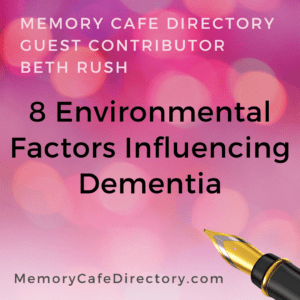Memory Cafe Directory posts and/or links to retailers can be advertising, sponsored, or affiliate links. We may earn a small commission from them. Thank you.
Dementia is a devastating disease. It robs countless older adults of the full pleasure of their later years, stripping away memories and independence. It also takes a toll on caregivers who work with this population.
This condition is complex. What causes it?
Researchers have found genetic and environmental factors they suspect in playing roles, but the precise cause is often impossible to pinpoint.
Still, there is reason for hope. By understanding the connection between dementia and the environment, individuals and caregivers can take proactive measures to slow disease progression and improve overall quality of life. Here’s what you should know about environmental factors and dementia.
The Connection Between Dementia and Environment
Many diseases have a genetic component, including dementia. However, not everyone who tests positive for certain gene variations develop symptoms of the disorder. What makes some people sick while others live long, healthy lives disease-free despite their faulty DNA?
Researchers have begun to understand how environmental factors influence how genes express themselves. By performing research on twins with the same genes, they can pinpoint the percentage of probability ascribable to DNA.
However, sometimes, these pairs express disease symptoms differently – or not at all – thanks to non-shared environmental influences that determine how those genes express themselves or whether they “switch on.”

Photo by Chris LeBoutillier on Unsplash
For example, COPD (chronic obstructive pulmonary disease) has a genetic component, but cases are also rising due to climate change. Poor air quality can aggravate upper respiratory diseases and contribute to premature death.
Some evidence suggests that increasing temperatures may similarly impact dementia cases. Extreme cold has a similar effect on hospital admission rates.
Other environmental factors that impact dementia include nutritional deficiencies. Specifically, researchers have found evidence that low B-vitamin levels – especially B12 – can increase risk. Chronically low hydration levels can also influence your dementia risk as much as vitamin deficiency.
The results of multiple studies demonstrate that physical activity lowers your dementia risk. Movement keeps oxygen-rich blood and nutrients flowing into your brain tissue. So does keeping your brain active; lifelong learners and bilingual individuals are less likely to develop the disease.
Conversely, the dementia and environment connection positively correlates smoking with disease development. Caregivers with loved ones who use tobacco should encourage them to quit by providing free resources. Likewise, heavy drinking can increase disease risk threefold, so it’s best to drink in moderation or not at all.
8 Ways to Lower Dementia Risk: Managing Environmental Factors
Now that we understand the connection between dementia and the environment, what meaningful changes can you implement in your loved ones’ lives to ease symptoms and slow disease progression? How can you care for yourself and reduce your risk of developing the disease if you have a genetic predisposition?
The following activities are science-based and have been demonstrated to lower risk. Implement one or more into your lifestyle and encourage participation among those for whom you care.
1Dance
Dance is the clear winner of all the physical activities you can participate in to lower your dementia risk. Researchers compared those involved in a dance program with other activities, such as completing crossword puzzles and riding bikes. While many exercises proved effective, dance was most effective in reducing risk.
Why? The answer lies in neuroplasticity and neurotransmitters. When you participate in physical activity, your brain increases the production of endorphins – feel-good chemicals that ease pain and induce a mild, natural euphoria. It also boosts levels of happy neurochemicals like serotonin and dopamine.
These conditions create a ripe environment for new neuronal connections to occur. What makes dance so magical is that participants have to pay attention and try to follow the steps while their brain is immersed in happy chemicals. Somehow, the combination works.
You don’t have to enroll in a vigorous Zumba program – although you should try it if you enjoy a fast-paced workout. However, you can also achieve benefits through milder movements like ballroom dancing.
2Master a New Skill
Mastering new skills also increases your neuroplasticity. It helps you form new synaptic connections, which you can think of as brain pathways. The more you have, the quicker you can recall information. Plus, if one roadway gets blocked, you have alternative routes.
Fortunately, you have plenty of affordable options for lifelong learning. There’s no need to earn another degree. Check out your local library and parks and recreation department listings for low-cost, in-person classes on anything from basket weaving to basketball drills.
Are you more comfortable with tech? Sites like Udemy offer courses on any topic imaginable (animal reiki, anyone?) for as low as $10.
3Improve Your Diet
You can control what you eat and influence your loved one’s meal plans. Copious evidence suggests that highly processed foods laden with white flour, sugar, and trans fats increase oxidative stress in the body, upping your risk of disease.
Dietitians recommend the Mediterranean and MIND diets for dementia prevention. Both emphasize plenty of fresh fruits and vegetables, lean proteins like fish, healthy oils like olive oil, and whole foods close to their natural forms.
The Mediterranean diet emphasizes whole grains and legumes and minimizes red meat and sweets. The MIND variation incorporates DASH diet components to reduce overall sodium intake.
 |
 |
 |
| Find these books on Amazon | ||
4Stay Active
Your neurons, or nerve cells, communicate through axons and dendrites. The more dendrites a nerve cell has, the more connections it can make. Exercise boosts the number of dendrites in each neuron, helping you make new mental leaps.
How often should you work out? According to the World Health Organization, you should engage in moderate to vigorous activity for approximately 30-60 minutes daily. However, you don’t have to join a gym. There are low-cost fitness activities available, like:
- Walking: All you need is a secure pair of shoes. However, you should accompany individuals with memory problems.
- Resistance bands: Resistance bands cost little and can help you squeeze in two to three days of strength training each week.
- Yoga: You can find a style to suit anybody and find tons of free videos on YouTube.
- Apps: You can find various fitness apps, often for far less than the cost of a gym membership. You get a ton of variety, so try something new every day.
5Engage in Social Activities
Loneliness increases your chance of all-cause mortality and can influence dementia risk. Humans are social creatures who process thoughts and emotions with others.
How can you make friends as an adult? Participate in activities like recreational sports and classes. You can also find Memory Cafes for individuals living with dementia and caregivers alike, or online dementia support groups for caregivers to share your experiences and find others who understand your challenging journey.
6Try a Different Route
Doing the same things you know by habit engages your brain’s default mode network but doesn’t allow for growth. However, you can encourage neuroplasticity by shaking up your daily routine.
Drive a different route home from work – GPS apps can help you plot your course. Do you always take a salad for work? Switch it up with a veggie wrap. Habitually scroll social media on your work breaks? Try chatting with your colleagues or taking a walk around the building.
Anything that takes you out of reflex mode and makes you mindfully choose your actions encourages neuroplasticity.
7Learn a Second Language
Bilingualism is a form of cognitive stimulation. If you already speak more than one language, practice switching between the two. It will keep your skills sharp while decreasing your dementia risk.
If you don’t speak anything but English, it’s not too late. You can find many language learning apps that let you practice at your pace. Some include live classes with native speakers, enabling you to enjoy a bit of social time while mastering a new tongue.
8Get Enough Sleep
Researchers still don’t fully understand the mystery of sleep, but they know it’s essential for cognitive functioning. Chronic insomnia increases your dementia risk. How can you get more shuteye? Try the following tricks:
- Unplug: The blue light from cellphones and computer screens interferes with melatonin production, a vital sleep hormone. Put your devices on a charger outside your bedroom at least 30 minutes before you say goodnight.
- Be consistent: Good sleep hygiene means going under and waking up at roughly the same time, even on weekends. Doing so helps train your circadian rhythm.
- Keep it cool: Studies suggest that most people sleep best in temperatures around 65 degrees or less. If you don’t have a programmable thermostat, try one and set it to increase 30 minutes before you awaken. The warmth serves as a sensory alarm clock while letting you save energy overnight.
Environmental Factors and Dementia
Researchers have learned a lot about the dementia-and-environment connection. You can’t eliminate your risk if you have genetic factors. However, you can improve your chances of never developing the disease by managing your daily habits and activities.
Employ the eight suggestions above to create favorable environmental conditions that discourage disease development. Changing your habits may increase your chances of fully enjoying your golden years.
About the Author
Beth Rush

Beth Rush
Beth Rush is the Managing Editor and Content Manager at Body+Mind.
Body+Mind features articles about diet, fitness, mental health, parenting and health care.
Become a Contributor!
 Do you want to be a Memory Cafe Directory contributor? If you have helpful information to share with our community, read about the guidelines, then get in touch to discuss what you have to offer.
Do you want to be a Memory Cafe Directory contributor? If you have helpful information to share with our community, read about the guidelines, then get in touch to discuss what you have to offer.
Thank you.






